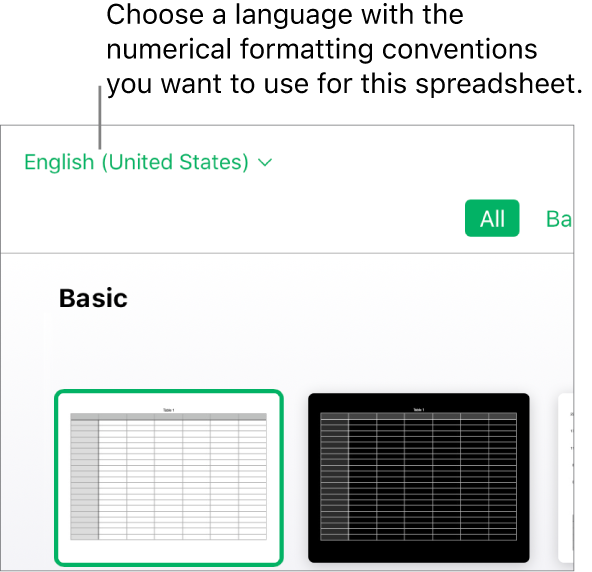
Create a spreadsheet with the formatting of a different language in Numbers for iCloud
When you create a new spreadsheet, you can choose to have numerical data (such as dates, times, or currency) in tables and charts formatted according to the conventions of a specific language and region. For example, some regions use commas instead of periods to indicate decimal points, or they use different monetary symbols for currency, or they display text from right to left instead of left to right.
You might want to do this if you plan to share the spreadsheet with someone in another region. This language setting affects only the current spreadsheet.
Go to Numbers for iCloud
 , then sign in to your Apple Account (if necessary).
, then sign in to your Apple Account (if necessary).In the document manager, click
 in the toolbar.
in the toolbar.Click the pop-up menu in the top-left corner of the template chooser, then choose a language.
If the formatting conventions of a language differ by the region in which it’s spoken, choose the language and region you prefer—for example, English (United Kingdom).

When you choose a new language, the titles of the templates and some formatting options in the Format
 sidebar change to reflect the language.
sidebar change to reflect the language. Double-click a template (to narrow the choices, click a category along the top).
When you view a spreadsheet that uses different language formatting, a message near the bottom of the spreadsheet indicates the formatting used. To see examples of the formatting differences, click the language in the message.

If you add numbers, dates, times, or currency to a table in this spreadsheet, you can format the data using the conventions of the chosen language. Charts also reflect that language’s conventions.
After a spreadsheet is created, you can only change its formatting conventions in the Numbers app on a Mac, iPhone, or iPad. For more information, open the Numbers app on your computer or device, then choose Help > Numbers Help (on a Mac) or tap More > Numbers Help (on iPhone or iPad).